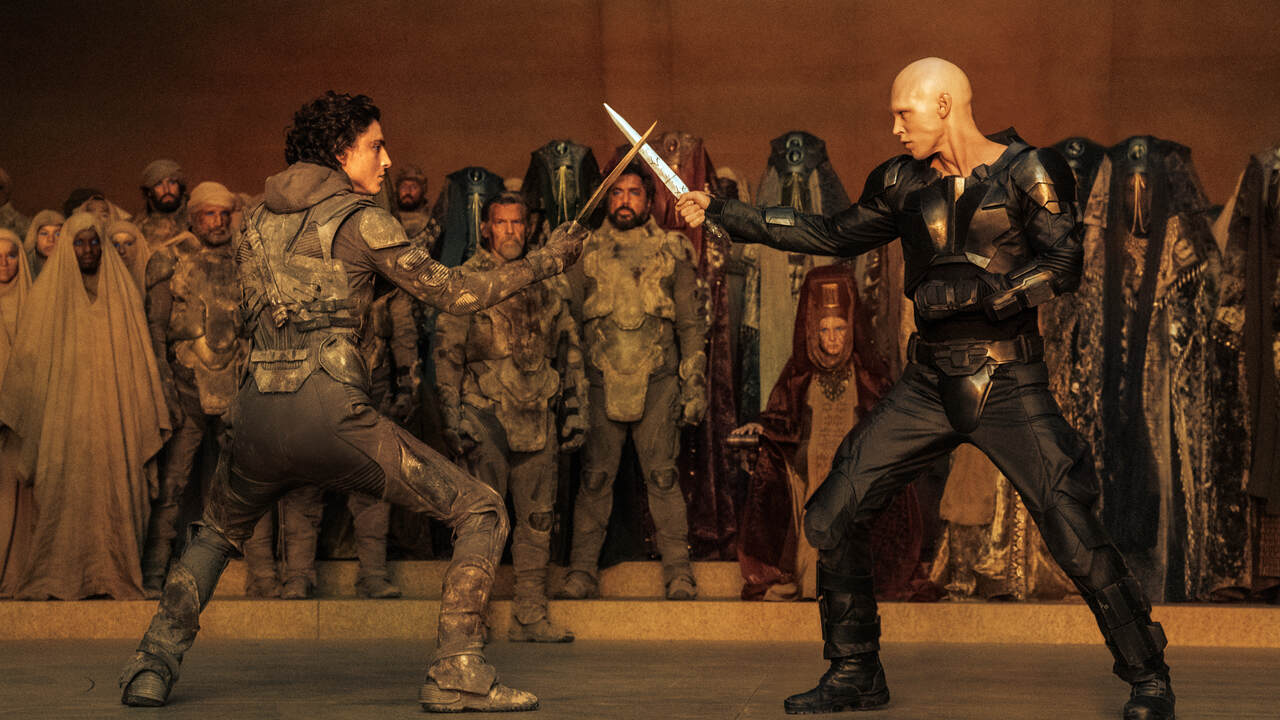
Frank Herbert's Dune was long considered one of those juggernauts that couldn't be fitted to the big screen. Based on what I have heard about the novel, it's expansive, it's complex, it's too much. With the 2021 Dune, however, director Denis Villeneuve streamlined the story of the book to create an understandable series of events. This might as well be Villeneuve's greatest achievement, and he hits the bull's eye again in this sequel. Dune: Part Two, like the first installment, can be easily grasped by anyone. The devious schemes and shenanigans are simplified for the viewer's consumption. Yes, Dune: Part Two is intelligible, but that doesn't mean it's in any way intriguing or sensational. While it might not be a slog, it's also not really exciting in any manner.
Villeneuve is so busy making his Dune movies digestible that he forgets to make dialogues engaging, and expositions enjoyable. Their delivery, too, is flat. You feel as if the actors are reading words from a menu at a restaurant. Information is dumped on the audience without any hint of vigor. The movie is the cinematic equivalent of a robotic voice reading Dune: Part Two's plot section on Wikipedia. Villeneuve co-wrote the screenplay with Jon Spaihts. Sometimes, the film takes such a giant leap that you are thrown off balance. For instance, we see Paul (Timothée Chalamet) asking Chani (Zendaya) if Stilgar (Javier Bardem) will teach him to ride a worm. She says no, and then a few scenes later, Stilgar tells Paul he has taught him well, and Paul, within a few minutes, starts riding the biggest worm. When did the training happen? How exactly does one prepare himself physically as well as mentally to ride such a giant and dangerous creature? The movie doesn't give any answer. What it provides instead is a hero moment, which it never really earns. The rousing music tells us to cheer for Paul, but we don't buy into his heroism.
The visual effects don't leave you in awe. They are functional, not spectacular. The huge metallic machines do their jobs. You are not impressed by them; you merely admire them from a distance. Villeneuve is a "tasteful" director. His images are neatly arranged - they form a nice pattern. The movie wires you to respect its visual creations. Villeneuve, like a self-serious nerd, plays with his expensive toys and tells you to be "thoughtful," "respectful," and "humorless." He is not imaginative, just sorely literal. Lady Jessica's (Rebecca Ferguson) conversations with her unborn daughter are shot without a trace of creativity (the movie laughably movies between the fetus and Jessica's response). When Stilgar informs Jessica that she needs to replace their Reverend Mother, she drinks the Water of Life, transmutes the poison, and inherits the memories of the female ancestors. This movie, however, merely winks at this ritual. The exact process is shown to us in glimpses. Later, when Paul drinks the Water of Life, we see an amateurish slideshow of the faces of the female ancestors. It's all very incurious, uninvolving, unremarkable. The moments that do manage to attract your attention (soldiers flying up a mountain, a body falling from a chopper-like vehicle, our [mis]understanding that Paul has been fatally stabbed by his cousin) look minor.
Dune: Part Two is rendered so simple that you can sum up significant developments in this manner: Paul says he doesn't want to be the Chosen One, and then he becomes the Chosen One. Paul says he doesn't want to go to the South and then goes to the South. Even after spending 165 minutes with the characters, you feel as if these crucial decisions are not organically taken. Rather, the characters take a leap from one state to another. Paul forcefully declares he will stay in the North and orders Gurney Halleck (Josh Brolin) to go with the others. Still, in the very next scene, he immediately and emotionally agrees to go to the South. Perhaps Frank Herbert's book cannot really be made into a satisfying cinematic experience.
All the actors here have superb talent, but Villeneuve confines them into a limited space, bringing out something painfully monotonous. Only Bardem manages to escape from his dull surroundings. He makes you chuckle when his character speaks highly of the prophecy and dispenses praise for Paul. Austin Butler as Feyd-Rautha Harkonnen is deliciously twisted. His pleasure for violence is visible in a black-and-white sequence. The scene, though, is devoid of any violent force. Villeneuve's beauty is impersonal. It doesn't have the enticement of an image from a "cold, calculating director" (like Shane Carruth). Even the final shot works because of Zendaya. The actress, if only fleetingly, fills the screen with strong emotions. Her expressions prove to be more precious, more breathtaking, more appealing than this entire expensive production.
Final Score- [4/10]
Reviewed by - Vikas Yadav
Follow @vikasonorous on Twitter
Publisher at Midgard Times
Hi Everyone, after a due consideration, we have decided that we will be open for donations to help us in managing our website. We will be greatful for any kind of amount we receive. Thanks!
— Midgard Times 🎬 (@Moviesr_net) January 4, 2026
PayPal- [email protected] pic.twitter.com/DlNNz5Npm5
Get all latest content delivered to your email a few times a month.
Bringing Pop Culture News from Every Realm, Get All the Latest Movie, TV News, Reviews & Trailers
Got Any questions? Drop an email to [email protected]